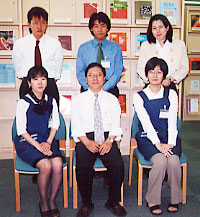  |
 |
 |
|
Towards the Age of Electronic Libraries
| Kazunori Nakabayashi |
| BSI Information Center |
|
 |
 |
Staff
of the Experimental Animal
Facility(Myself,2nd person from top left) |
Human
beings acquired language during evolution as a means of communication. Later,
development of a written language made it possible for us to pass on information
to people not in our presence. Many ancient cultures have left behind a rich trove
of written inscriptions that today, several hundred or thousand years later, can
still be seen on the walls of ruins (although some cultures never invented a written
language).
The invention of paper allowed us to communicate with people in remote areas.
Printing technology enabled us to dramatically increase the amount of information
that could be reproduced and distributed, so that today our surroundings are flooded
with a variety of printed materials.
Now, large amounts of printed materials, produced at the source of information
(i.e. at the source of processing ), can be delivered via courier to those who
need them. However, there is still a time-lag between the producing and receiving
of information ム we cannot see printouts nor get information until they reach
us. Meanwhile, as computer technologies, including the Internet and networks,
have undergone remarkable development, the need to distribute printed materials
has continued to decrease. Data objects now remain only at their sources and anybody
who needs them can access them through the networkムregardless of where they are
or the time they need them. What is attractive about this is that there is no
longer a time-lag and the information can be seen the moment it is generated (processed)
ム no matter where we may be.
Due to the continued development of these networking technologies, the publishing
industry, including newspaper companies, will in all probability experience a
drastic change in the way they do business. One can already see companies entering
the trial and error phase as they work to make the transition. In the future,
electronic journals or electronic books will no doubt be common and customary
in our society.
The BSI Information Center currently runs the BSI Library and it is our aim to
turn it into an electronic library that mainly covers electronic journals. BSI
is not an educational institution, but rather a research organization where researchers
are expected to produce practical results. Thus, what researchers really want
is information on the latest worldwide research results, rather than simply educational
materials that are compiled systematically. The newly established library at BSI
does not have a large collection of books, but instead offers a large number of
foreign journals- which is another good reason for us to set up an electronic
library without concerning ourselves too much about the format (i.e. traditional
book-style materials). Unfortunately, we lack the external environment (for electronic
journals) needed for further development. We hope that in the future a wider variety
of journals will be published electronically using unified standards and access
methods that will make for easier retrieval and browsing.
Computers, which are indispensable to electronic libraries, have undergone breathtaking
development in the 55 years since they were invented. Remarkable advances in the
vacuum tube, transistor, IC and LSI technologies have made for higher performance,
lower prices and greater miniaturization. Still, what has remained relatively
unchanged since the beginning is the fact that computers are nothing but tools
for arithmetic or logical operations. They are indeed convenient to use, but we
cannot expect them to process anything unless we provide them with instructions.
Unfortunately, providing these instructions can be difficult when many people
still find computers difficult to use. This fact cannot be denied. Luckily, computer
use is gradually becoming easier to due to increased technical development and
greater efforts by software developers. The only way to prevent ourselves from
being governed by new technologies of the future will be through increased skill
and effectiveness in manipulating them.
Rapid and increased development of Internet technologies, computer technologies
(not only current computer technologies but brain-like computer technologies as
well), and electronic journal technologies are some of the key catalysts needed
for the successful implementation of our electronic library. We look forward to
a day when these developments will be the norm allowing user-friendly, people-oriented
systems to bring advanced technologies within reach of everyone. |
  |
|
|






